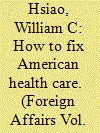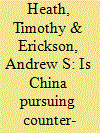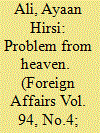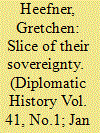| Srl | Item |
| 1 |
ID:
170879


|
|
|
| 2 |
ID:
142803


|
|
|
|
|
| Summary/Abstract |
The term “counter-invention” has become burdened with conflated meanings and thus controversial in describing aspects of Chinese national and military strategy. Yet, the term should be retained although refined in two ways to help U.S. policymakers and planners devise appropriate responses to Chinese behavior aimed at undermining U.S. leadership in Asia.
|
|
|
|
|
|
|
|
|
|
|
|
|
|
|
|
| 3 |
ID:
139341


|
|
|
|
|
| Summary/Abstract |
We have a problem—not a problem from hell, but one that claims to come from heaven. That problem is sometimes called radical, or fundamentalist, Islam, and the self-styled Islamic State is just its latest iteration. But no one really understands it. In the summer of 2014, Major General Michael Nagata, the commander of U.S. special operations forces in the Middle East, admitted as much when talking about the Islamic State, or ISIS. “We do not understand the movement,” he said. “And until we do, we are not going to defeat it.” Although Nagata’s words are striking for their candor, there is nothing new about the state of affairs they describe. For years, U.S. policymakers have failed to grasp the nature of the threat posed by militant Islam and have almost entirely failed to mount an effective counteroffensive against it on the battlefield that matters most: the battlefield of ideas.
|
|
|
|
|
|
|
|
|
|
|
|
|
|
|
|
| 4 |
ID:
152909


|
|
|
|
|
| Summary/Abstract |
Using the case study of Libya, this article examines how U.S. policymakers sought to rationalize their appropriation of sovereign territory for strategic needs in the 1940s. This article also demonstrates how scholars can use the often-overlooked infrastructure of the U.S. military to historicize the bottom-up construction of U.S. global power.
|
|
|
|
|
|
|
|
|
|
|
|
|
|
|
|
| 5 |
ID:
142696


|
|
|
|
|
| Summary/Abstract |
The nuclear deal that the United States and five other great powers signed with Iran in July 2015 [1] is the final product of a decadelong effort at arms control. That effort included sanctions in an attempt to impede Iran’s quest for a nuclear weapons capability. The Joint Comprehensive Plan of Action , or JCPOA, ranks as one of the most deficient arms control agreements in history. But U.S. President Barack Obama has pledged to spend the remainder of his tenure fending off congressional pressures to adjust its terms
|
|
|
|
|
|
|
|
|
|
|
|
|
|
|
|